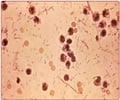Pathogens associated with moderate-to-severe diarrhoea in infants have been discovered by scientists.

The researchers said that recruited children with moderate-to-severe diarrhoea seeking care at health centres along with one to three randomly selected matched community control children without diarrhoea.
From patients with moderate-to-severe diarrhoea and controls, they said they obtained clinical and epidemiological data, anthropometric measurements, and a faecal sample to identify enteropathogens at enrolment.
One follow-up home visit was made about 60 days later to ascertain vital status, clinical outcome, and interval growth.
They enrolled 9439 children with moderate-to-severe diarrhoea and 13 129 control children without diarrhoea.
By analysing adjusted population attributable fractions, they found that most attributable cases of moderate-to-severe diarrhoea were due to four pathogens: rotavirus, Cryptosporidium, enterotoxigenic Escherichia coli producing heat-stable toxin (ST-ETEC; with or without co-expression of heat-labile enterotoxin), and Shigella.
Advertisement
They also found that odds of dying during follow-up were 8.5-fold higher in patients with moderate-to-severe diarrhoea than in controls.
Advertisement
The researchers noted that interventions targeting five pathogens (rotavirus, Shigella, ST-ETEC, Cryptosporidium, typical enteropathogenic E coli) could substantially reduce the burden of moderate-to-severe diarrhoea.
New methods and accelerated implementation of existing interventions (rotavirus vaccine and zinc) are needed to prevent disease and improve outcomes, they added.
The research was published in Lancet.
Source-ANI










